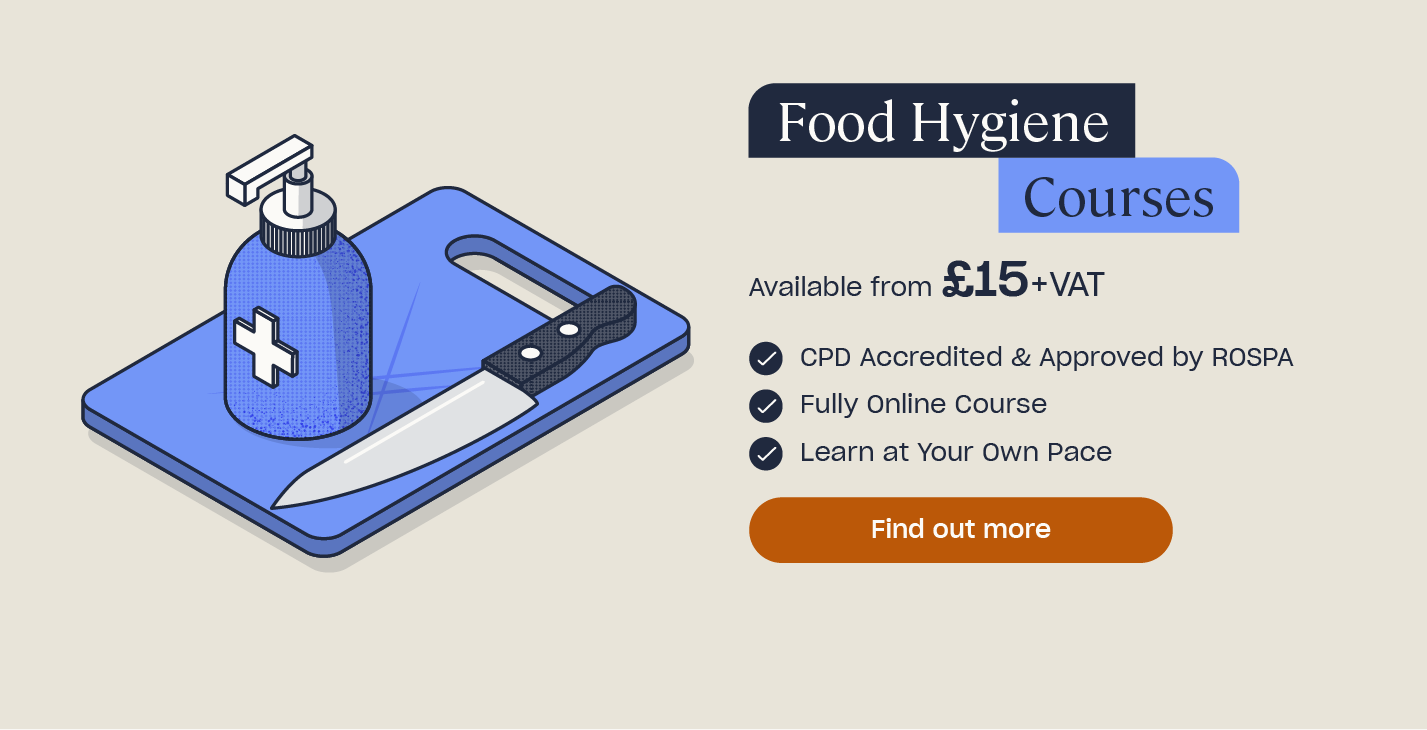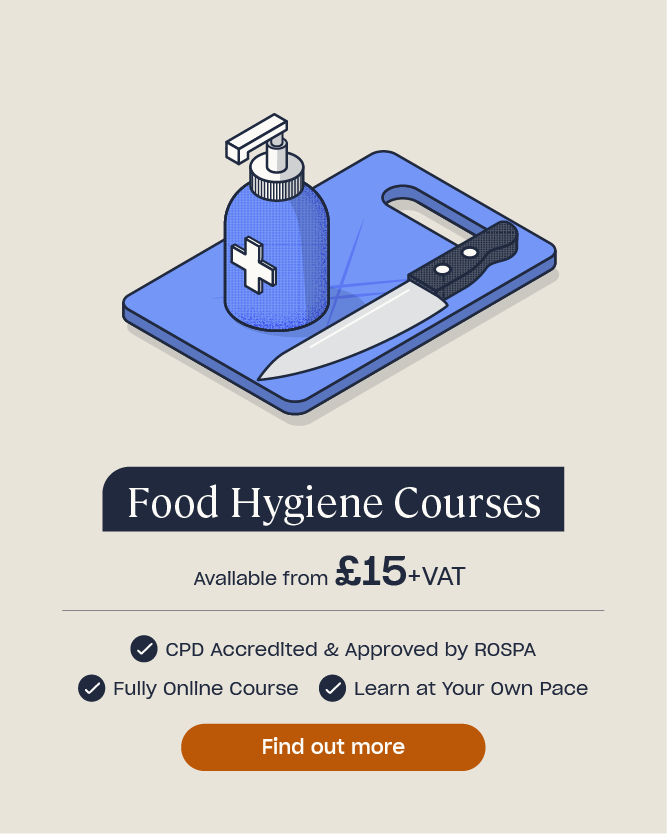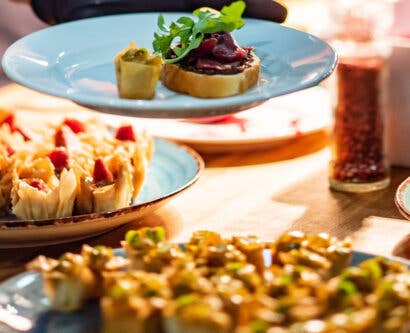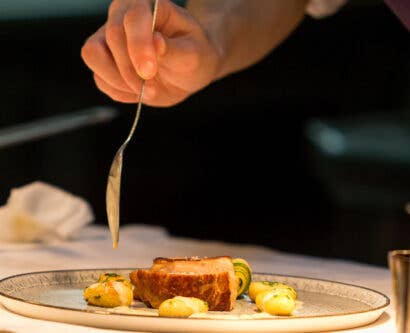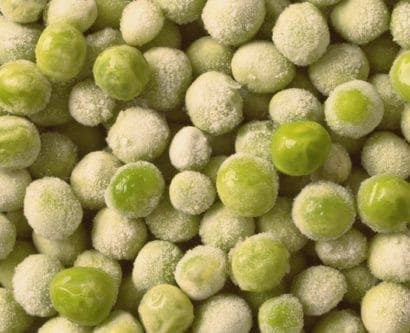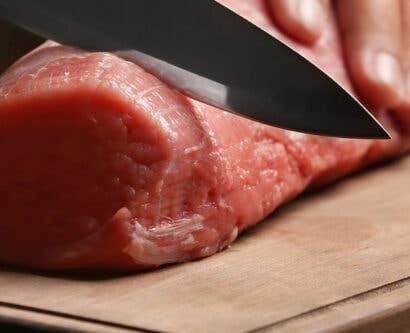How to Become a Baker
If the thought of starting each day with the delicious smell of baked goods wafting through the air sets your soul on fire, then a career as a baker might just be the perfect job for you. Bakers are skilled craftspeople who make a wide range of tasty foods in various different locations. Whether baking on an industrial scale or for a small independent business, a career in baking can be incredibly rewarding and lead to numerous opportunities in the hospitality industry.
In this article we will explore everything you need to know about what a baker does, the different responsibilities that a baker has, the qualifications and skills needed to become a baker and how to secure a job as a baker.
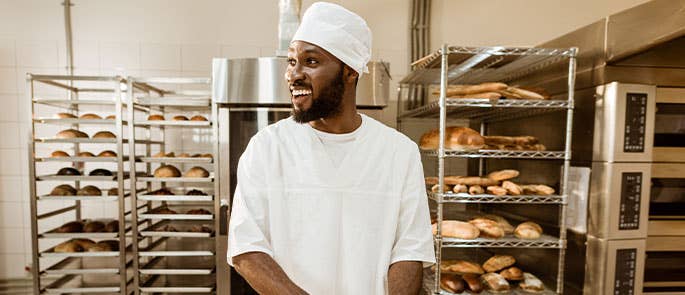
What Does a Baker Do?
Bakers use their expertise and technical skill to prepare and create a range of baked goods such as bread, cakes, pastries and pies. They work in a variety of environments such as industrial factories, independent bakeries, commercial bakeries and restaurants. They often work very early in the morning so as to prepare baked goods for sale during business hours.
Whilst there is undeniably an overlap between the two roles, a baker is different to a pastry chef. Pastry chefs tend to focus specifically on desserts and typically work in hotels, restaurants and patisseries. Comparatively, bakers often work on a wide range of baked goods, both sweet and savoury, on a much larger scale. However, bakers who specialise in pastries can pursue additional training and certification to become a pastry chef.
Bakers can specialise in a particular product and whilst many bakers make a range of products on a daily basis, some focus on their particular specialism, honing their skills and developing new recipes and techniques to perfect their craft. Baker specialisms include, but are not limited to:
- Artisan bakers
- Patisserie bakers
- Cake bakers
Responsibilities of a Baker
Bakers have many different responsibilities and these can vary depending on the environment in which they work and their particular specialism. However, some common responsibilities and duties that a baker may have include:
- Developing recipes.
- Weighing and mixing ingredients by hand or with equipment.
- Batch baking products such as bread, cake and pastries.
- Decorating finished cakes and other baked goods ready for sale.
- Quality control.
- Monitoring baking processes.
- Stock management.
- Making personalised orders for customers.
- Maintaining food hygiene standards.
What Qualifications do you Need to be a Baker?
You don’t need a formal qualification to become a baker. However, employers are likely to look more favourably upon those with qualifications and extensive work experience. Baking is a delicate craft and it requires technical skill and knowledge to ensure consistent high standards. As such, pursuing a formal qualification and training can help bolster your chances of securing employment.
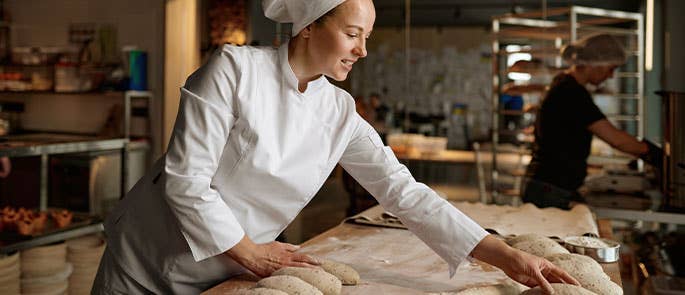
Qualifications that can help you to pursue a career as a baker include:
Baking College Courses
A college course in baking will provide you with the hands-on training and practical skills necessary to become a baker. You could pursue a broader course such as hospitality and catering or focus specifically on a baking course. The entry requirements will vary depending on where you choose to study, however you are likely to need at least two GCSEs, including English and maths, in order to apply. Once you have completed your course you can then progress to further qualifications or try to get a job in a bakery and gain more hands-on experience. Some establishments offer both college level and undergraduate level courses. In these cases you can often complete the college level course, receive the necessary qualification and then progress to the degree course at the same institution, though this will vary from place to place.
Baking Degree
An undergraduate degree in baking will provide you with the same hands-on experience and technical training as a college course, however when you finish your studies you will have a degree. As with a college course, the entry requirements will vary, however you are likely to need 3 A Levels with grades ranging from CCC to CCD and at least 5 GCSEs including English and maths. As mentioned above, some establishments offer both college level and degree level courses and so a college qualification from the same institution may fulfil the necessary entry requirements.
Baking Apprenticeships
Apprenticeships are a great way to ‘earn while you learn’ and provide you with the same hands-on experience and technical learning as a college qualification or undergraduate degree, with the added benefit of simultaneously earning a salary. Whilst there are commonalities between a baking apprenticeship and a college or undergraduate qualification, a baking apprenticeship tends to focus predominantly on the practical aspects of baking, whereas other qualifications also include the theoretical side of baking. Apprenticeships enable you to develop skills that will support a long term career in baking under the guidance and supervision of a professional baker.
The following apprenticeships can help you start your career as a baker:
- Baker Level 2 Intermediate Apprenticeship
- Lead Baker Level 3 Advanced Apprenticeship
- Pastry Chef Level 3 Advanced Apprenticeship
Apprenticeships can take between 1 – 2 years to complete and whilst the entry requirements can vary, you are likely to need at least 5 GCSEs including English and maths.
Work Experience
As mentioned, you don’t need to have a formal qualification to become a baker and it’s possible to gain the necessary skills and knowledge from work experience. It’s worth noting that some employers may still require basic qualifications such as a GCSE in maths and/or English. Nevertheless, the practical knowledge gained from work experience can be incredibly beneficial and make you a viable candidate for a role. You can gain work experience by working in a bakery, whether that be a local independent bakery or the bakery section of a supermarket. Moreover, you could reach out to companies and ask if they offer work experience or if you could shadow one of their bakers for a day to learn some useful skills.
Work experience is great on-the-job training and under the supervision of senior bakers you can learn all of the technical skills necessary to become a baker. Moreover, you may find that after completing work experience at a business, they offer you a full-time position. Depending on what is available to you in your area it may be hard to find work experience specifically in a bakery. However, hands-on hospitality experience of any kind can help you to stand out from the crowd and can be developed into more relevant skills. For example, if you work in a coffee shop that sells baked goods made in-house, you could ask to come in early a few days a week to watch how the bakers prepare the goods. This, coupled with the experience gained from your day-to-day role as a barista, can still prove to be beneficial and give you an invaluable insight into a career as a baker.
Want to Learn More?
Want to learn more? Bakers need to have a solid understanding of food hygiene and allergen management in order to keep people safe. Our range of Food Hygiene Training, including Level 2 Food Hygiene and Safety and Food Allergen Awareness Training can give you a head start and provide you with the necessary knowledge to keep customers safe. Completing these courses can boost your CV and help you to stand out from the crowd when applying for jobs.
Skills of a Baker
As well as hard skills such as the technical skill and knowledge of how to bake and prepare different goods, there are also a range of useful soft skills that can support a career in baking. Regardless of which entry route you choose to begin a career as a baker, you will learn the necessary hard skills to hone your craft as you study or gain work experience. Soft skills can be developed alongside your hard skills and they will help to ensure your efficiency as a baker.
Useful soft skills for a baker to have include:
- Excellent customer service
- Attention to detail
- Strong communication skills
- Interpersonal skills
- Active listening
- Time management
- Ability to work under pressure
- Physical strength and stamina
- Organisational skills
- Digital literacy
- Strong teamwork skills
- Desire to learn
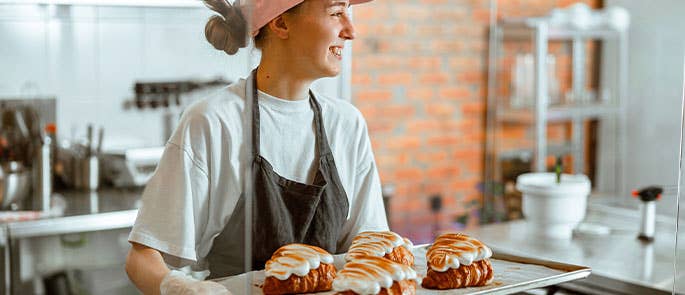
How to Get a Job as a Baker
The first step in getting a job as a baker is to ensure that you have the qualifications and/or work experience necessary to secure a career. As mentioned, whilst there are no formal qualifications needed to become a baker, employers often look more favourably upon applicants with qualifications, than those without. That being said, baking can be an incredibly competitive field and in many cases, real-word, hands-on experience trumps theory focused classroom learning. As such, don’t feel disheartened if you do not have a qualification as your work experience is still an incredibly valuable asset for you to have.
Regardless of which entry route you pursue, ensure that your CV is up-to-date, free from errors and mentions everything that you have learned about baking. Be sure to detail any hands-on experience that you have gained as well. Our guide on How to Write a CV can help you to develop the best CV possible. Whilst it’s highly unlikely that you will be working remotely as a baker, interviews are now conducted in a myriad of ways. Our article on How to Stand Out in a Virtual Interview will provide you with handy preparation tips to make a great first impression and these can be applied to an in-person interview as well.
Once you have got your CV together, it’s time to start applying. The National Careers Service is a great place to start looking for your ideal role as a baker. You could also use the government’s Find a Job service to see what is available in your area or apply directly to bakeries. When applying for roles, as well as mentioning your hands-on experience, be sure to research the company and in your cover letter include why you wish to work for that establishment, especially if there are specific businesses that you know you would like to work for.
After securing your role as a baker, you can then develop your craft and hone your skill. This will help with any future career progression as you diversify your skill set and network with others in the industry. You may choose to pursue a specialism, open your own bakery or gain further qualifications and pursue a career as a pastry chef. Whatever you decide to do, your time working as a baker will provide you with countless opportunities to develop your skill and become an expert in your field.
A career as a baker can be incredibly rewarding and varied. Whether you end up developing recipes for large brands, baking bread for a local independent restaurant or start your own business, a career in baking provides you with the opportunity to be creative and innovative in the kitchen. Taking the time to gain hands-on experience and relevant qualifications will support a long, successful and fulfilling career as a baker.
Further Resources:
- Food Hygiene Courses
- How to Start a Bakery Business
- 5 Key HACCP Considerations for the Bakery Industry
- Health and Safety in a Bakery: Free Checklist
- How to Become a Barista


